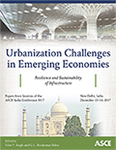ASCE India Conference 2017
Predictive Modeling for Infrastructure System Engineering
Publication: Urbanization Challenges in Emerging Economies: Resilience and Sustainability of Infrastructure
ABSTRACT
Civil infrastructure systems emphasize on co-existence of the different structures together as a system that is highly dynamic and with behavior that varies on wide temporal and spatial scales. Furthermore, urban environments can be viewed as a “system of systems” with complex interactions and interdependencies existing among its individual systems. The focus has been comparatively more on the resilient design of the individual infrastructure components rather than how infrastructure components interrelate and interact to make up a dynamic system. To model complex infrastructures systems with time-varying behaviors, system theory is a powerful tool that allows analytical and computational methods to fully describe the complex dynamics of independent and interdependent infrastructure systems. Cyber-physical systems are a new class of sensor-rich engineered systems that entail not only sensors but computing and actuation cohesively integrated for monitoring and controlling of the applications. The vast historical as well as real-time data obtained from such systems and its semantics result in a knowledge repository. Predictive analytics is one of the best practices of extracting information from such a repository in order to determine patterns and predict future outcomes and system behavior. Our earlier work proposed a decision support framework comprising a geologic prediction model, and a construction strategy decision model for tunnel design. We further extend and generalize the framework by including a predictive analytics model for effective engineering of infrastructure component(s) within a civil infrastructure system. The predictive analytics framework is sustainable due to its self-adaptive properties.
Get full access to this article
View all available purchase options and get full access to this chapter.
REFERENCES
Breiman, L. (1996). “Bagging Predictors.” Journal of Machine Learning, Volume 24 Issue 2, August 1996, Pages 123 - 140.
De, P. (2008), ‘Infrastructure Development in India’, in Kumar, N. (ed.), International Infrastructure Development in East Asia - Towards Balanced Regional Development and Integration, ERIA Research Project Report 2007-2, Chiba: IDE-JETRO, pp.105-130.
Ejigu, A. (2007). "A Systems Approach to Infrastructure Planning: Understanding Complexity and Uncertainty.", Master of Science Thesis - SoM EX 07-11, KTH, Department of Urban Planning and Environment, Division of Urban and Regional Studies, Kungliga Tekniska Högskolan, Stockholm.
Evermann, J. and M. Tate (2016). "Assessing the Predictive Performance of Structural Equation Model Estimators." Journal of Business Research, Volume 69, Issue 10, October 2016, pp. 4565-4582.
Godau, R. (2004). “Infrastructure Systems Engineering.” INSIGHT: April 2004, Vol. 7, No. 1, 7-8.
Grogan, P. (2014). “Interoperable Simulation Gaming for Strategic Infrastructure Systems Design.” Ph.D. Thesis, Massachusetts Institute of Technology, June 2014.
Harvey, R. and McBean, E. (2014) "Predictive and Spatial Analytics for Planning Inspections of Sewer Infrastructure". International Journal of Environmental Protection, April 2014, Volume 4 Issue 4, pp. 48-57.
Huang, G. and Chang, N. (2003). "Perspectives of Environmental Informatics and Systems Analysis.” Journal of Environmental Informatics 1(1) 1-6.
INCOSE (2000) “Systems Engineering Handbook Version 2.0.” INCOSE, San Diego, California, USA.
Kruchten, P. (1995). “Architecture Blueprints - the 4+1 View Model of Software Architecture”. In TRI-Ada Tutorials, pages 540-555, 1995
LaRiviere, J., McAfee, P., Rao, J., Narayanan, V. and Sun, W. (2016), "Where Predictive Analytics Is Having the Biggest Impact", Harvard Business Review, May 2016.
Maier, M. (1998). “Architecting Principles for Systems-of-Systems". In: Systems Engineering, Volume 1 Issue 4, January 1998, pp. 267-284.
Matar, M., Osman, H., Georgy, M., Abou-Zeid, A. and El-Said, M. (2017). “A Systems Engineering Approach for Realizing Sustainability in Infrastructure Projects.” Elsevier HBRC Journal, 2017, Production and hosting by Elsevier B.V. on behalf of Housing and Building National Research Center, Volume 13, pp. 190-201.
Mishra, N. and Silakari, S. (2012). "Predictive Analytics: A Survey, Trends, Applications, Opportunities & Challenges." International Journal of Computer Science and Information Technologies, Vol. 3 (3), 2012, Pages 4434-4438.
Vora et al. (2016). "Predictive Decision Support Framework Based on Data Mining Techniques for Tunnel Engineering", In the Proceedings of the International Conference on Sustainable Infrastructure(ICSI), Shenzhen, People’s Republic of China, October 2016.
Weijnen, M., Herder, P. and Bouwmans Ivo (2008). "Designing Complex Systems: A Contradiction in Terms." In Eekhout, M., R. Visser and T. Tomiyama, Delft Science in Design, A Congress on Interdisciplinary Design 3: 235-254.
Whyte, J. (2016). “The Future of Systems Integration within Civil Infrastructure: A Review and Directions for Research.” INCOSE International Symposium, 26: 1541-1555.
Zielinski, S. (2006). “New Mobility: The Next Generation of Sustainable Urban Transportation.” The Bridge 36 (Winter 2006), pp. 33-38.
American Society of Civil Engineers (ASCE) (2017). "Preparing for the Future." Report Card for America’s Infrastructure. URL: http://www.infrastructurereportcard.org/solutions/preparing-for-the-future/.
Article in The Economic Times (2017). “All Eyes on India’s Mega Infrastructure Push.” Article in The Economic Times India Infra Summit, January 2017, http://economictimes.indiatimes.com/etinfrasummit_articles.cms.
National Academy of Engineering (NAE) (2008). “Grand Challenges for Engineering.” URL: http://www.engineeringchallenges.org/.
TOGAF Worldwide. http://www.opengroup.org/subjectareas/enterprise/togaf/worldwide. (visited on September 19, 2017).
Information & Authors
Information
Published In
Urbanization Challenges in Emerging Economies: Resilience and Sustainability of Infrastructure
Pages: 502 - 508
Editors: Udai P. Singh and G. L. Sivakumar Babu, Indian Institute of Science
ISBN (Online): 978-0-7844-8203-2
Copyright
© 2018 American Society of Civil Engineers.
History
Published online: Dec 13, 2018
Published in print: Dec 13, 2018
Authors
Metrics & Citations
Metrics
Citations
Download citation
If you have the appropriate software installed, you can download article citation data to the citation manager of your choice. Simply select your manager software from the list below and click Download.
